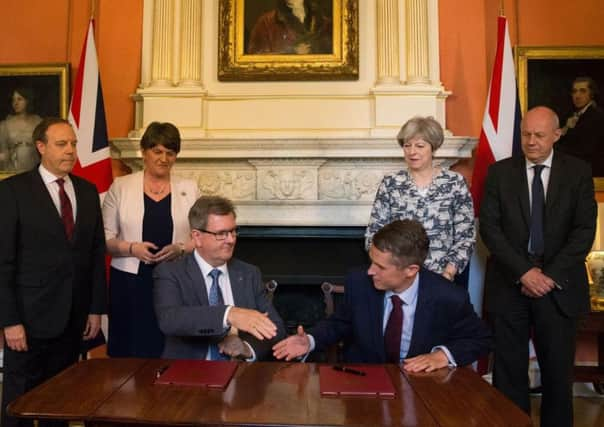DUP £1 billion being spent before it has been authorised by Parliament


Amid confusion even in the Cabinet as to how the money which bought the DUP’s votes can be spent, the News Letter has established that the first £20 million tranche of the cash is already being spent by Stormont departments despite the possibility that Parliament could vote not to approve the spending.
Rather than authorising expenditure of the money prior to it being spent, the Government is planning to ask Parliament to approve the expenditure after some of it has already left the Government account.
Advertisement
Hide AdAdvertisement
Hide AdThe Treasury told the News Letter that the “funding committed in the Confidence and Supply Agreement is subject to the full authorisation of the UK Parliament through supply estimates which will take place soon”.
It is understood that the money is likely to next month be bundled in with wider public spending authorisation in what are known as the Spring Supplementary Estimates, a tidying-up exercise which regularises public spending in the final few weeks of the financial year.
If Parliament rejected the spending of money which had already gone – something which would require a Tory backbench rebellion – it is not clear what would happen.
One source suggested that auditors would class it as irregular expenditure which would then still require retrospective Parliamentary authorisation.
Advertisement
Hide AdAdvertisement
Hide AdIn September the Government’s lawyers had told Gina Miller, who had challenged the basis of the DUP deal, that “additional payments contemplated by the agreement will be authorised by parliament”.
And on Thursday new Northern Ireland Secretary Karen Bradley indicated to the News Letter that the money could not be spent unless Northern Ireland ministers were in place, before quickly retracting that and saying that the money could be spent regardless of whether there are ministers.
Ms Bradley said the first £50 million had been made available to Northern Ireland departments but that only £20 million of that would be drawn down by the end of the financial year on March 31. Speaking of that money, she said the government was “fully committed to making it available”.
Several sources familiar with the intricacies of Parliamentary approval for public sector spending said that it was not unusual for the supplementary estimates process to cover some spending which had already occurred.
Advertisement
Hide AdAdvertisement
Hide AdHowever, most cases involving retrospective Parliamentary approval for spending are uncontroversial or the result of some emergency. By contrast, the DUP deal money is both politically contentious and has been known about for months so is not a sudden unplanned expenditure.
In evidence of further confusion about how the money can be spent, Stormont’s Department of Finance – which is administering the money in Northern Ireland on behalf of the Treasury – said at the start of this week in reference to the £30 million earmarked for next year that “access to this funding requires the approval of both Parliament and the Assembly”.
In late November, the Department of Finance said that £20 million “is being drawn down now from the Treasury” and on Monday the department confirmed that the money was being allocated to health and education to be spent before March 31 but that it would not be drawing down the additional £30 million which the Government had offered under the DUP agreement.
In a statement last night, the Northern Ireland Office said: “Funding committed in the Confidence and Supply Agreement is subject to the full authorisation of the UK Parliament through the annual Supply Estimates, a process which will take place soon.
Advertisement
Hide AdAdvertisement
Hide Ad“As the Secretary of State set out during the passage of the Northern Ireland Budget Act 2017, the UK Government made available £50m of the funding in this financial year to address immediate health and education pressures.
“The Northern Ireland Civil Service has decided to access only £20m of it in 2017-18, asking for the remaining £30m to be made available next year. In response to this request, HM Treasury has granted flexibility over when the funding can be drawn down. This does not alter the UK Government’s commitment to make the full £50m available to support public services in Northern Ireland.
“Northern Ireland departments have reflected these positions in their spending plans for 2017-18. The £20 million will be included in the 2017-18 Parliamentary Supplementary Estimate process and will be subject to the approval of the UK Parliament.”
When asked about the situation, Stormont’s Department of Finance said that the funding would be “subject to the full authorisation of the UK Parliament, as with all sums discharged from the UK Consolidated Fund”.
However, it added that the Treasury “has confirmed that we can spend the £20 million, subject to Parliament’s approval and departments have incorporated this into their spending plans for 2017/18”.